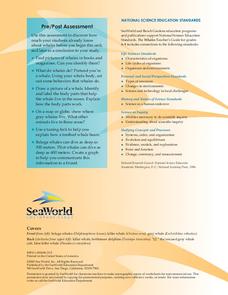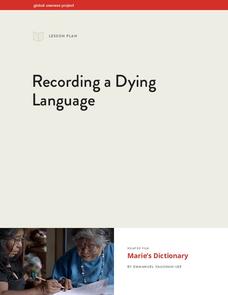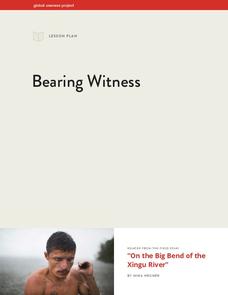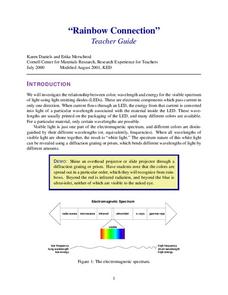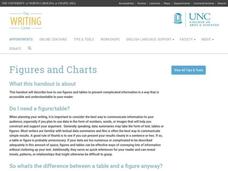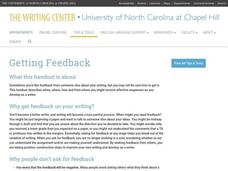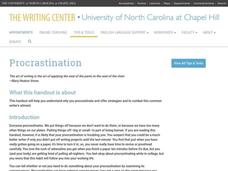K12 Reader
The Scientific Method
Introduce the scientific method with a reading comprehension activity. Have kids read a few paragraphs that describe the process of making a hypothesis, gathering evidence, and taking notes that will support the experiment.
August House
The Magic Pot
The Magic Pot by Patricia Coombs is the theme of this multidisciplinary lesson plan. Early readers first take part in a read aloud and grand conversation about the story's details. Then, they get to work practicing their skills in...
Teach Engineering
Energy Conversions
What energy conversions occur in the operation of a device? Small groups investigate devices and the energy conversions that occur. The groups create energy flow diagrams with added conversion processes for each of the devices...
Curated OER
The Dragonflies of Summer
The best thing about dragonflies is that they make great topics for informational texts. Get those readers excited with a fun and interesting insect-related text passage that can help them increase their comprehension skills. As children...
Terminix
Amazing Insect Facts
Insects are like little aliens living all around us. Explore fun and interesting insect facts by having the class read a short informational paragraph. The paragraph focuses on how we are similar and different to insects and includes...
Sea World
Whales
A whale of a lesson is sure to intrigue your elementary oceanographers! Learn about the mammals of the sea with a series of activities about whales, dolphins, and porpoises. Kids complete worksheets about the anatomy of a whale, create a...
This Reading Mama
Compound Word Pack
Class + room = classroom! And your class + this compound word game = fun and learning! Kids match cards that include words and sometimes images to create compound words.
Spur Design
PrestoBingo Colors
Open children's eyes to the wonderful world of colors with a fun interactive game. From red, blue, and green to garnet, sapphire, and chartreuse, this resource engages young students in learning about all sorts of different colors.
Curated OER
Penny Science
A penny can be a much more valuable teaching tool that you might think. Whether you are teaching about chemical reactions, surface tension, the behavior of gases, or are just looking for engaging activities for early finishers, this...
Willow Tree
Perimeter of Common Geometric Figures
Help learners understand that perimeter and circumference are one in the same. Learners apply their skills to determine the perimeter/circumference of triangles, rectangles, and circles. They then use the same strategy to find the...
Global Oneness Project
Recording a Dying Langauge
Is there value in preserving indigenous languages that are almost extinct? That's the question posed to viewers of a short film about the attempt of one Native American woman who is creating a dictionary for Wakchumni, the language of...
Curated OER
Lesson Plan Outline for Rainbow Science
Young scientists study light reflection and refraction as they determine the critical angle, the rainbow angle, and color separation in rainbows. Teams record the data they collect in a shared spreadsheet and discuss results with the class.
NOAA
The Biggest Plates on Earth
The deepest part of the ocean is the Marianas trench where two tectonic plates meet. Scholars explore plate tectonics and their boundary types by completing hands-on activities throughout the lesson. Specific areas, such as the Galapagos...
Global Oneness Project
Bearing Witness
A controversial construction project in South America, the Belo Monte dam, is endangering local cultures, ecosystems, and communities. High schoolers create a concept map based on an online article they read before engaging in discussion...
American Physiological Society
Why is Kettle Corn Cooked in Copper Pots?
The kitchen — it's not just for eating anymore! Specific heat is often a difficult concept to grasp, so give it context by relating it to cooking. Learners gain experience in the principles of thermal energy transfer by designing an...
Cornell University
LEDs Rainbow Connection
View LED lights through the eyes of a scientist. Young scholars learn to view light as a wave frequency and connect various frequencies to different colors on the light spectrum. A lab activity asks groups to measure the frequency of...
Channel Islands Film
Island Rotation: Lesson Plan 1
How do scientists provide evidence to support the theories they put forth? What clues do they put together to create these theories? After watching West of the West's documentary Island Rotation class members engage in a series of...
University of North Carolina
Figures and Charts
Sometimes words aren't the best way to get information across to the reader. The eighth handout in the 24-part Writing the Paper series describes different type of figures and charts to display complex information in a paper....
University of North Carolina
Statistics
Let's see you back it up! As shown in the 18th handout in the Writing the Paper series of 24 lessons from UNC, statistics help form an effective argument. The handout discusses how to analyze a source and break down the data to ensure it...
University of North Carolina
Citation Builder
Does the publication date come before or after the title? Should there be a comma between the location and year? The answer depends on whether you're using the MLA, APA, Chicago,4or CSE/CBE style guide. A citation builder clears up...
University of North Carolina
Latin Terms and Abbreviations
N.B.. cit., n.b., viz., sc., inf. e,g,—these abbreviations frequently appear in academic papers and on works cited lists, but what do they mean? Part of a larger series to improve writing skills, the handout on Latin terms and...
University of North Carolina
Getting Feedback
As many writers know, you are your own worst editor. The 10th installment in the Writing the Paper series explains that getting feedback from others is crucial to the writing process. The handout highlights the best time to ask others to...
University of North Carolina
Procrastination
Inevitably, whenever you give an assignment, at least one person won't start until the last minute. As the 13th handout in the 24-part Writing the Paper series explains, procrastination sometimes brings consequences. It breaks down...
North Carolina Consortium for Middle East Studies
Missing Pieces of the Puzzle: African Americans in Revolutionary Times
What's missing from most studies of the American Revolutionary War is information about the role African Americans played in the conflict. To correct this oversight, middle schoolers research groups like the Black Loyalists and Black...







